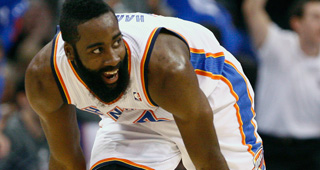There are so many different things to take in with the James Harden trade that it proves difficult to piece together where to start.
For me, it begins with a lament: The Oklahoma City Thunder team that so many of us had grown to love over the past few years is dead and never to return. A different core could be better or worse, yet it still will be different. As someone who got to see the Thunder both on the floor and in the locker room from Harden’s first season until now, it continued to astonish me how strong their chemistry was on and off the court. In most other sports, I bemoan the focus on more ethereal qualities like chemistry, yet personal relationships matter in basketball as it is the most interdependent of the major American sports by a longshot. This Thunder team had that in spades in both the short and long-term in a way that stood out compared to every locker room I have had the chance to experience over the past three years.
The even larger issue than chemistry has to be that James Harden did a magnificent job correcting most of Russell Westbrook’s flaws, particularly on the offensive end. With Kevin Durant acting as the steadier player and Westbrook as the peaks and valleys guy, Harden had to be whatever the team needed him to be and did it incredibly well. He could facilitate, hit open shots, or create opportunities as the situations presented themselves. Most high-level PG’s can handle more of the nuance of running the offense than Westbrook has in recent years and Harden provided much of that buffer.
The other major thing that Harden gave the Thunder was a third player that had the ability to take over a game. People will talk about how the Thunder triumvirate had problems on the defensive end but the bigger story was that just about no one could handle them on the offensive side. With the changing role of the big man in today’s NBA, it proves easier to find defensive difference-makers than guys who can reliably carry the offense. That is particularly true when considering the assets Sam Presti has year in and year out to make the team better. John Hollinger’s recap talked about how fit and the role of a “defense-and-3’s” type, which holds some merit until you remember the one core truth of the NBA: the rules of fit do not apply to elite teams.
The real truth of the James Harden trade is that it likely eliminates them from the title picture for longer than some people are thinking. In the NBA, championships are won by elite talent. As I wrote in 2009, the last non-Pistons team to win an NBA title without a player who had already won an MVP award was the 1981 Celtics that had four Hall-of-Famers and an eventual MVP in Larry Bird. While Harden will likely never be in that class, what he provided the Thunder with was another high-level talent in a league where that proves necessary. High-level non-superstars like Harden separate the other teams with superstars and the Thunder had the best four man grouping for the future in Durant, Westbrook, Harden, and Ibaka. Unless Jeremy Lamb becomes something substantially better than nearly everyone expects or the Raptors’ lottery pick becomes much better than anticipated, it will be incredibly difficult for Sam Presti or any other GM to get another player as good as Harden around their main trio. Having little more than the mid-level exception and a few draft picks at his disposal gives Presti the tools to make the Thunder a team with more and better rotation players but no more true studs unless they hit the lottery. Remember that three of the four guys were top five picks- not the easiest thing to come across without giving up talent or getting incredibly lucky.
While much will be said about Harden’s apparent refusal to sacrifice, the real refusal that should be centered on is Clay Bennett’s refusal to pony up for the chance to compete for titles. The difference between Harden’s rumored deal and the Eric Gordon max may mean something to Mr. Bennett’s pocketbook and that would be a deplorable argument for breaking up a team that had the potential to be competitors for years. The Thunder were the best team in the Western Conference this year and moving forward while all of their competitors in the West are either far away from them now or on the wrong side of the aging curve. The Lakers and Spurs could make a few runs yet no one had the future the Thunder did. Is Miami better than Oklahoma City? Yes. However, being the top team in the Western Conference and having only one better team in the entire league pretty much stands as the best situation a team can reasonably find themselves in since the Heat are one defection or injury from leaving that season’s title wide open (look at Chicago without Rose…). Having the pieces the Thunder had would have given them enough shots at the brass ring to get it at least once or at least be a team totally worthy of their fans investment of both energy and money.
Also, I do not want to hear about the “sacrifice” angle of this when it comes to salary. Neither Westbrook nor Durant gave a cent back and neither was asked to. Ibaka did and that is great, but it appears that ownership was even less willing to give up something even more trivial (money). Now Harden gets the opportunity to make his money and likely play on a fascinating team with ownership that is willing to spend what it takes to be elite. We’ll see how that works out.
Beyond the decision to trade Harden, the Thunder got back a very nice package for their player. Kevin Martin duplicates and exacerbates many of the defensive problems the Harden/Durant combo had while also bringing a capable scoring touch into the fold. As a far bigger fan of Jeremy Lamb than most as a draft prospect, I see his potential as a role player on a great team, yet it seems wholly unlikely that he even sniffs Harden territory in terms of impact at any point during his Oklahoma City tenure. The lotto pick from Toronto is nice while the other players the Thunder gave up do not make that much of a difference. The trade itself was actually somewhat impressive given the circumstances; my problem was with the concept and rationale behind trading Harden regardless of this fact.
As for the Rockets, they now have one of the most interesting backcourts in the entire league for years to come. Harden and Jeremy Lin could eventually have a relationship with similar symbiosis to the one James had with Westbrook where Harden picks up the playmaking slack when Lin hits a rough patch and produces in other ways the rest of the time. Considering their power forward trove was untouched in the deal and they just signed Omer Asik to his deal, Darryl Morey and the Rockets can use the max money they still have post-Harden in 2013 to make a major impact either through free agency or a trade. I immediately had thoughts of Andre Iguodala opting out and heading southeast for a few seasons of amazing basketball. There are plenty of other options worth thinking about and Rockets ownership has shown a willing to roll the dice to try and make a great team. Houston instantly jumps up the Western Conference ladder for this year despite needing time to gel and still has the pieces to make major moves as soon as they like to build around their brand-new core. It should be immensely fun to watch.



